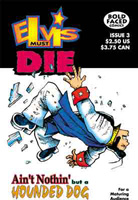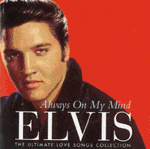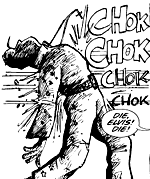>> The Friday Review: The Birthday Riots
>> The Friday Review: A Distant Soil: The Gathering
More...

 Writer/Artist: Neil R King
Writer/Artist: Neil R King
Price: $9.95
Publisher: Bold Faced Comics
Collecting ELVIS MUST DIE #1-3
ISBN: 0-97014982-4
Web site: www.elvismustdie.com
Elvis Aaron Presley. If the rock and roll lifestyle has a patron saint it surely must be this man. From his gleaming jacketed youth, through the remarkably long stream of movies and his final, fast food ridden years, Elvis embodies the rock and roll lifestyle. He is the King. He's also intimately connected to Forteana.
Elvis is part of an elite group of individuals who have either inspired religious-level devotion or simply will not die quietly. There were, at last count, around three thousand Elvis impersonators worldwide, and arguably as many theories surrounding his death. My personal favourite has him and Jim Morrison running a bar in Florida and jamming together every evening. Whether you believe them or not, there is something otherworldly about Elvis. He has become something more than a skinny white boy with some good tunes. He has become a phenomenon, a cultural Banquo's ghost. A member of Club Forteana.
And, unsurprisingly, he has made more than one appearance in comics. The splendid WHITE TRASH by Alan Grant and Dean Ormston for example, sees a young man who bears a striking resemblance to Axl Rose hooking up with "The King" and leaving a trail of destruction across the states. It's savagely violent, ugly as hell and incredibly funny. One of the pin-ups in the trade paperback sums the book up perfectly. The young man is slumped against a ten-foot tall tower of speakers, guitar on, exhausted, grinning from ear to ear. The King is standing to one side of him, saying:
"Okay, we're going to do this again and this time, I say this time, we're going to slow it the fuck down!"
WHITE TRASH indeed. However, there is one appearance by Elvis Aaron Presley that sums up perfectly both his place as the once and future king and as a Fortean ghost. ELVIS MUST DIE.
The title itself is evocative, and oddly acute. For Presley's immortality to be assured, he had to die, and do so in the frankly bizarre manner that he did. Presley had done everything, covered everything and even survived well into the Disco decades, a rock and roll relic in a barren wasteland of boogie. For him to live, he had to die. Similarly, the characters in ELVIS MUST DIE must put their lives on the line to have them completed.
The idea is elegantly simple, and oddly compelling. The hundreds of thousands of Elvis impersonators across the world are all part of an unofficial secret service. Trained and run by The King himself, it picks any one of them at any time to carry out suicide missions for the good of the country. And they do it, filled with honour and pride. After all, to die in the service of one's country is honour enough, but to die in the service of the King? There is no higher honour.
 What makes ELVIS MUST DIE genuinely interesting, aside from the central premise, is how it's approached. ELVIS MUST DIE is an anthology title, detailing the individual stories of these men and their date with final destiny. As a result, the title slides into the same American myth hinterland that the Nevada UFO bases of THE X-FILES, or closer to home, the urban horror of MIDNIGHT NATION occupies. This is what America looks like in the places where no one notices. This is the secret hierarchy that keeps the country running and inspires men to defend their country with their lives.
What makes ELVIS MUST DIE genuinely interesting, aside from the central premise, is how it's approached. ELVIS MUST DIE is an anthology title, detailing the individual stories of these men and their date with final destiny. As a result, the title slides into the same American myth hinterland that the Nevada UFO bases of THE X-FILES, or closer to home, the urban horror of MIDNIGHT NATION occupies. This is what America looks like in the places where no one notices. This is the secret hierarchy that keeps the country running and inspires men to defend their country with their lives.
The stories themselves are a fascinating mixture of humour and genuine tragedy. 'Jailhouse Rocked' follows Del, a plumber by trade, who receives the call to break into a prison and retrieve the false tooth of Inmate 152. It would be all too easy for the story to fall into lazy comedy violence and become little more than a novelty gunfight between Elvis and some cops. Instead, we're shown Del as a well-rounded and happy human being, with a love sufficiently fanatical for his work that he's prepared to give up his business, the woman he loves and his life for the cause.
Del is so desperate for something more than the life he has that he's fully prepared to be a martyr to the King after just one phone call. Over the space of the two issues, we see Del suffer a crisis of faith, realise exactly how small he is in relation to the bigger picture and still carry out his job. He's a good man, but a man fixated on the rock and roll lifestyle. It may be better to burn out than fade away, but the damage that the King causes isn't shied away from.
Instead, the first story in particular has a distinctly sinister tone to it. Del's martyr complex emphasises over and over again that here is a healthy, intelligent young man throwing himself into near certain death for the ideals of an American that may no longer exist, on the orders of a man who should be dead. Here, Elvis is less a Fortean ghost and more the living embodiment of the New World Order. He knows where his troops are all the time, and is prepared to use them in any way to get the job done.
For the members of his group, a call from the King can mean redemption. It's analogous to a practising Catholic having God come round for tea. The man whose life they have based their whole existence on is asking them for a favour, the man who created them, shaped their mindset wants them to lay their lives down for him. For these men, the only answer can be yes. The fact that they are viewed as lunatics at worst and fools at best only reflects on the state of Elvis' legend today. The price one pays for Fortean immortality seems to be a near total dissection of one's life and work.
 Everything, from how he treated his wife and staff to his dietary eccentricities has been intimately explored. The King has been pulled apart on every level, his later years continually parodied and held up as the embodiment of rock and roll excess. However, "Elvis" can still mean dangerous and sexy as well as old and mad. This is where ELVIS MUST DIE comes in, reinventing Elvis as a shadowy New World Order spy and in doing so, making him dangerous again. The King of ELVIS MUST DIE may be old in body, but he has the razor sharp instincts and mind of his younger self. Physically, he's "Torch Song Trilogy" but mentally he's "Blue Suede Shoes" all the way.
Everything, from how he treated his wife and staff to his dietary eccentricities has been intimately explored. The King has been pulled apart on every level, his later years continually parodied and held up as the embodiment of rock and roll excess. However, "Elvis" can still mean dangerous and sexy as well as old and mad. This is where ELVIS MUST DIE comes in, reinventing Elvis as a shadowy New World Order spy and in doing so, making him dangerous again. The King of ELVIS MUST DIE may be old in body, but he has the razor sharp instincts and mind of his younger self. Physically, he's "Torch Song Trilogy" but mentally he's "Blue Suede Shoes" all the way.
Of course there's also a healthy dose of humour in here, as there was in much of the King's style. The "E-Men" finish most of their sentences with "Thank you verruh much", while at one point, Del's girlfriend finds herself grimly thankful that they've not had kids, fearing that they'd call her "Momma". The humour is easy, unforced and neatly stops ELVIS MUST DIE from taking itself too seriously. More importantly, it also serves to counterpoint the most tragic moments of the stories, bringing them into stark relief.
But Elvis died, and so did the series. At present, ELVIS MUST DIE stands at three issues collected in one volume, and two uncollected issues. All five issues can be downloaded for a dollar each at JamBooks.com. It's unfortunate that no further material has yet been produced, and yet also oddly fitting. A rock-and-roll fate for a rock-and-roll series. Besides, somewhere in America right now, the odds are that an Elvis impersonator's phone is ringing, and an impossible favour is being asked. Hail to the king, by any means necessary.
Thank you verruh much.

This article is Ideological Freeware. The author grants permission for its reproduction and redistribution by private individuals on condition that the author and source of the article are clearly shown, no charge is made, and the whole article is reproduced intact, including this notice.


